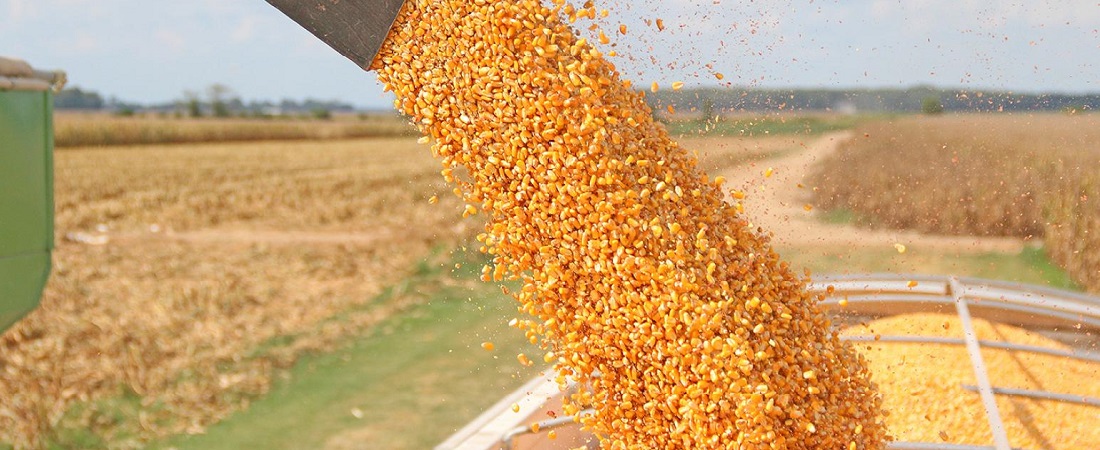
Brazil grain ouput to reach historic high due to corn 2nd crop
Aug, 23, 2022 Posted by Gabriel MalheirosWeek 202234
Brazil will break another record in 2022 with the biggest grain harvest in history. Perhaps the most important factor leading up to this was the harvest of the second crop of corn in Brazil, the safrinha crop. Previously considered merely a way to keep the soil in use between two important harvests, corn’s second crop gained importance as production became more sophisticated with the aid of technology.
Squeezed between the summer harvest and the winter off-season one, Brazil’s safrinha should lead to yields of 87.4 million tonnes, 44% more than the previous one, according to the Brazilian National Supply Company (Conab). This year’s result is likely to be the largest in the history of the country, proving that corn’s second crop is no longer second in importance, hence the fact that the territory it occupies and the output it will produce will be greater than those seen during the summer harvest.
Analysts believe that the growth in importance of the safrinha crop is an opportunity for Brazil to double its corn production in the coming years and move closer to world-class producers such as the United States and China. In addition to having enough space to increase grain production, the basis of Brazilian animal protein production as feed, the country also started employing corn to make ethanol.
This year, Brazil will produce 114.7 million tonnes of corn, a 31.7% increase compared to the previous harvest season. With this, the country should witness another record grain harvest, with 271.4 million tons, a growth of 6.2%, or 15.9 million tonnes compared to the previous crop.
Corn yields could have been even greater had it not been for the 15.3% drop in production in the southern region of Brazil earlier in the year due to lack of rain.
See below the track record of Brazilian corn exports from January 2019 to June 2022. The data below is from DataLiner.
Corn exports from Brazil | Jan 2019 – Jun 2022 | WTMT
Source: DataLiner (click here to request a demo)
Second crop growth
“We have a lot of room to grow, both in terms of acreage and productivity,” says André Pessoa, CEO of Agroconsult. He recalls that it took Brazil 15 years to increase grain production from 100 million to 200 million tonnes, but achieving 300 million will take less time.
Pessoa cites the expansion of the second corn crop as a Brazilian competitive advantage, noting that it already accounts for about half of the area of traditional summer grain farming. Moreover, the second crop of maize occupied an additional 1.64 million hectares this year alone, thanks to a scenario encouraged by favorable prices in domestic and foreign markets, as well as the anticipated soybean planting.
The earlier the soybean harvest, the better the “window” for planting second-season maize, keeping it from moving into the coldest and driest time of year.
Corn ethanol production
The production of ethanol with corn, a new use for the commodity in Brazil, should consume 10.3 million tonnes, up 30% compared to 2021, according to the National Corn Ethanol Union (Unem).
According to the executive president of Unem, Guilherme Nolasco, the corn ethanol sector is expanding.
“Corn ethanol has established itself as an alternative for verticalizing corn production, adding value and, since the last harvest, as an important equalizer in the fuel market.”
Today, 17 corn ethanol plants are in operation, 10 in Mato Grosso, 5 in Goiás, 1 in Paraná, and 1 in São Paulo.
Plants already on the market have been expanding their production since last year. Furthermore, at least two new units, one of which will be located in Dourados, Mato Grosso do Sul, should begin operations this year.
Source: Canal Rural
To read the full original article, please go to: https://www.canalrural.com.br/noticias/agricultura/safrinha-de-milho-leva-agronegocio-a-recorde/
-
Economy
Mar, 21, 2022
0
Trade balance surplus reaches US$ 10.11 billion in the year, up 43.9%
-
Grains
Aug, 24, 2021
0
Brazilian corn is forecast to drop 15.5 % this year
-
Other Cargo
Jun, 09, 2021
0
CSN is about to close the purchase of Elizabeth, Farallon’s cement company
-
Meat
Jan, 08, 2025
0
China and Lower Grain Prices Power Surge in Brazil’s Meat Exports

